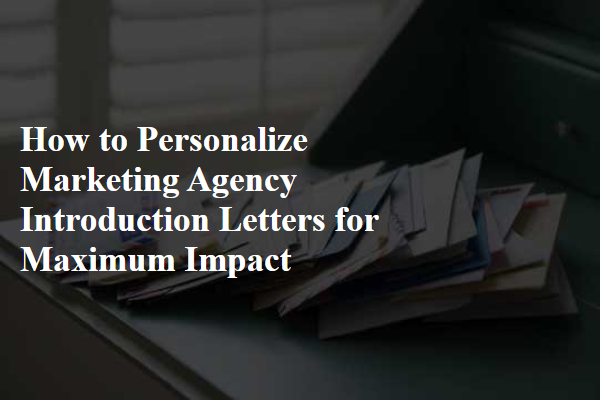
Personalize marketing agency introduction letters by researching the recipient's industry, company values, and recent achievements to tailor your message effectively. Highlight specific ways your agency's services align with their unique challenges and goals to demonstrate genuine interest and relevance. Use a conversational tone that reflects their brand voice, ensuring the letter feels custom-written rather than generic.
Researching Your Target Audience
Personalize marketing agency introduction letters by researching the recipient's business, industry, and specific challenges they face. Use this information to tailor your message, highlighting how your agency's expertise directly addresses their needs. Incorporate data-driven results and relevant case studies to demonstrate proven success and build credibility.
Leveraging Client Pain Points
Personalizing marketing agency introduction letters enhances client engagement and sets a foundation for strong business relationships. Tailoring content to reflect the recipient's needs and industry fosters trust and relevance.
- Research the Recipient's Business - Understanding the potential client's market, challenges, and goals enables crafting a letter that resonates specifically with their situation.
- Highlight Relevant Success Stories - Sharing case studies or examples related to the recipient's industry demonstrates proven expertise and builds credibility.
- Use a Personalized Tone and Language - Adapting the introduction letter's style to match the client's communication preferences creates a sense of connection and professionalism.
Tailoring Value Propositions
| Aspect | Details |
|---|---|
| Research Client Background | Analyze the client's industry, company size, target audience, and recent marketing campaigns to tailor the letter content effectively. |
| Use Client Name and Specific Details | Address the recipient by name and reference specific challenges or goals relevant to their business for a more personalized approach. |
| Highlight Relevant Services | Emphasize marketing solutions that directly address the client's pain points, such as SEO, content marketing, or social media management. |
| Showcase Experience with Similar Clients | Mention successful campaigns or case studies involving businesses in the same industry or with similar objectives. |
| Incorporate an Engaging Opening | Start with a compelling statement or question that resonates with the client's current marketing needs or aspirations. |
| Include Clear Call-to-Action | Encourage the recipient to schedule a consultation, request a proposal, or discuss potential collaboration options. |
| Customize Tone and Style | Match the tone of the letter to the client's brand voice, whether professional, casual, or innovative, to build rapport. |
| Proofread and Optimize for Readability | Ensure clear, concise language with optimized keyword placement for searchability and engagement. |
| Follow Up Strategically | Plan personalized follow-up emails or calls that reference points from the introductory letter to maintain interest. |
Incorporating Client-Focused Language
Personalizing marketing agency introduction letters involves researching the prospective client's industry, challenges, and goals to tailor the message precisely. Highlight specific services and past successes relevant to the client's needs for a compelling connection. Incorporate the client's name and reference recent milestones or projects to demonstrate genuine interest and build trust.
Highlighting Relevant Case Studies
Personalizing marketing agency introduction letters significantly enhances client engagement and response rates. Tailoring content to reflect specific client needs creates a compelling and relevant first impression.
- Research Client Background - Understanding the client's industry, business challenges, and goals allows for a customized message that resonates deeply.
- Highlight Relevant Services - Emphasizing agency solutions aligned with the client's unique requirements showcases value and expertise.
- Use Client-Specific Language - Incorporating terminology and references familiar to the client strengthens connection and trust.
Using Industry-Specific Insights
Personalizing marketing agency introduction letters significantly increases the chances of capturing a prospective client's interest. Tailoring content to reflect the recipient's industry, challenges, and goals demonstrates genuine understanding and relevance.
Research key details such as company size, recent campaigns, and target audience to create a customized message. Highlight specific services that align with the prospect's needs while addressing potential pain points for maximum impact.
Personalizing the Subject Line
Personalizing marketing agency introduction letters significantly increases engagement by addressing the recipient's specific needs and industry challenges. Tailored content demonstrates your understanding of their business, building trust and credibility from the outset.
Begin by researching the client's market, competitors, and recent achievements to highlight relevant successes and solutions. Incorporate personalized data points and client-focused language to create a compelling, memorable introduction that drives response rates.
Showcasing Social Proof and Testimonials
How can marketing agencies create personalized introduction letters that capture attention? Crafting tailored messages based on client research increases relevance and engagement. Customized letters address specific business needs and demonstrate genuine interest.
What key elements should be included in a personalized marketing agency introduction letter? Including the client's name, company details, and unique challenges shows thorough understanding. Highlighting how your services solve these challenges creates a strong connection.
Why is it important to avoid generic templates in introduction letters? Generic templates often lack emotional resonance and fail to build trust. Personalization enhances credibility and encourages recipients to respond positively.
How can incorporating data and case studies improve the effectiveness of introduction letters? Sharing relevant metrics and success stories validates your expertise. Data-driven insights make your proposals more convincing and actionable.
What role does tone and language play in personalizing marketing agency introduction letters? Using a conversational but professional tone fosters rapport with potential clients. Tailoring language to the client's industry and culture improves communication clarity and impact.
Offering Custom Solutions
Personalizing marketing agency introduction letters significantly improves engagement and response rates. Tailoring content to the recipient's industry, challenges, and goals demonstrates genuine interest and expertise.
Begin by researching the prospect's business and pain points to craft relevant messages. Incorporate specific examples of how your agency's services can address their unique needs. Use a conversational tone and include a personalized call-to-action to encourage further interaction.
Ending with a Clear, Personalized CTA
Personalizing marketing agency introduction letters enhances client engagement and builds trust from the outset. Tailored communication reflects understanding of the client's business needs and objectives.
- Research the Client - Analyze the client's industry, target audience, and recent marketing efforts to align your message.
- Highlight Relevant Expertise - Showcase specific case studies or services that address the client's pain points and goals.
- Use Client-Centric Language - Employ terminology and tone that resonate with the client's brand voice and culture.
Effective personalization increases response rates and strengthens the foundation for long-term client relationships.



Comments